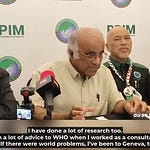In a heartfelt press conference on Feb 26, 2024, voices from South Korea's civil community rang out, calling for immediate action to address the tragic aftermath faced by families of COVID-19 vaccine victims. Cho Su-kyung, chairman of the Life Recovery Citizens' Group Coalition, and Kim Doo-kyung, chairman of the COVID-19 Vaccine Victim Family Association, shed light on a grave issue: the severe side effects caused by hastily approved COVID experimental gene therapy.
Cho Su-kyung revealed disturbing figures, stating, "Due to vaccine side effects, there have been around 2,700 deaths and about 1,800 (A17’s update: fixed translation error, sorry I’m working at the Speed of Science™) 19,000 severe cases." She further warned, "These are official statistics, but the actual numbers are said to be more than ten times higher." This staggering revelation points to a potential underreporting crisis, with the real impact possibly affecting tens of thousands of South Koreans.
Given that 96% of South Korea's population of 51.7 million has been vaccinated, these official figures—if indeed far below the actual counts—paint a grim picture of vaccine safety and oversight. With an estimated 27,000 deaths potentially linked to vaccine side effects, this equates to roughly 1 death for every 1,915 vaccinated individuals, a rate that for many raises significant concerns about the risks associated with these vaccines.
Historically, vaccines have been recalled or restricted for far fewer adverse events. For instance, the rotavirus vaccine Rotashield was withdrawn from the U.S. market in 1999 less than a year after its approval due to an association with intussusception, a rare form of bowel obstruction, occurring at a rate of 1 in 10,000 to 1 in 30,000 vaccinated infants. The scale of reported and estimated harm in the case of COVID-19 ”DNA contaminated gene therapy” disguised as vaccines in South Korea, as outlined by the conference speakers, dwarfs such precedent, questioning the threshold for action.
Cho Su-kyung criticized the lack of proper clinical testing before the vaccines' rollout, highlighting a breach of trust: "Trusting the government, they were vaccinated with vaccines that hadn't been properly tested in clinical trials, losing family members and depleting their savings on treatment costs for severe cases, shedding tears of blood every day." The call for accountability is clear, with Cho Su-kyung urging South Korea to follow the lead of countries like France and Germany, which employ a more humane approach to vaccine injury compensation.
Kim Doo-kyung added to the outcry, shedding light on the forced nature of the vaccination campaign despite the unconfirmed safety of the vaccines, which resulted in significant harm while the government downplayed the side effects.
The response from government bodies, like the Korea Disease Control and Prevention Agency (KDCA), has been less than satisfactory, with accusations of deceptive practices and a lack of true investigative intent into the vaccine's adverse outcomes. The call to action is not just for accountability but also for a reevaluation of how vaccine safety and compensation are handled, urging a departure from experimental vaccine administration without thorough vetting and consent.
As South Korea stands at a crossroads, the statements from Cho Su-kyung and Kim Doo-kyung resonate as a demand for change—a plea for the nation to rethink its approach to public health, vaccine safety, and the sanctity of human life. The bipartisan support for legislative action is not only a matter of political will but a test of the nation's commitment to its citizens' well-being and rights.
Signing off for now
A17
(As usual, full clip below)













Share this post